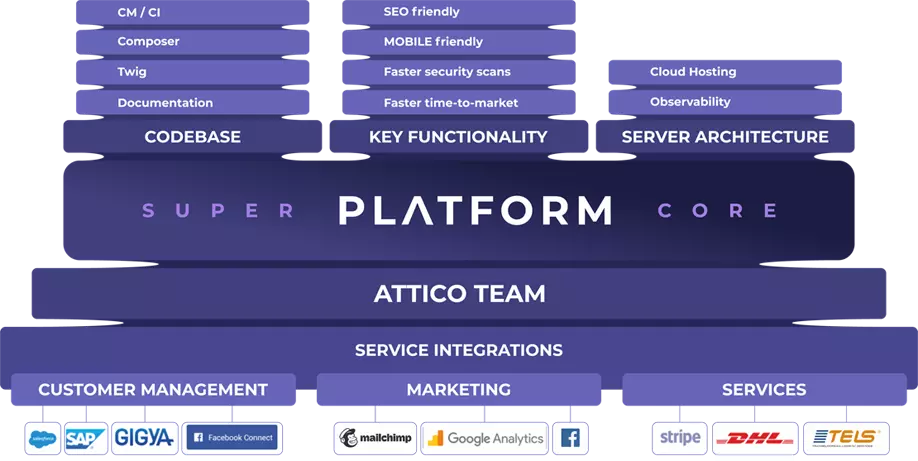Open Source CMS for the FMCG industry
Manage an unlimited number of websites, perform any integration, and conquer new markets - flexibly, quickly, reliably

Super Platform Performance

increase of the speed of feature delivery
faster time-to-market of new websites
decrease in the number of bugs
the security scan is passed on the first try
reduction in software cost
reduction in support cost
GDPR, MOBILE and SEO friendly
Integrations of the Open Source CMS
Don’t limit your web pages to integration!
These charts show how a super platform integrates with other services. Here, you can see all integrations - so useful and necessary for FMCG brands.

Achievements of FMCG companies with a super platform
Use cases: how an Open Source CMS works Use case 1.
Integration with the ERP System

Let’s suppose, you manage 40 websites for your brand. Our task is to integrate all your sites with the new ERP solution.
To do this, we did not integrate every website, but the core itself – the super platform.
All your websites are automatically integrated with the ERP system.
One integration costs about $2,000. It means that you would have to pay at least $80,000 for the total integration of your 40 websites with the ERP system.
Thanks to our innovative solution, you save $78,000 just on a single integration. (As a rule, the amount saved is much higher).
Use cases: how an Open Source CMS works Use case 2.
A landing page for a marketing campaign

Imagine, the Marketing Department of one of your local markets needs to deploy a new landing page for a PR campaign. Using the template modules presented on our platform, a marketing manager can create a skeleton of a landing page in a few clicks and fill it with content.
As a result, the process of creating marketing campaigns ceases to be long and expensive. Moreover, there is no need to hire technical specialists for its development.
User cases: how an Open Source CMS works Use case 3.
The super platform contains numerous integrations with HR services.
An HR manager can use a variety of templates to create an unlimited number of landing pages for recruiting candidates. Inside the super platform, HR can collect resumes and process them.

Also, your HR can place corporate announcements and create questionnaires for employees in the system. And all this stuff they do quite quickly and without the help of technical specialists.
Use cases: how an Open Source CMS works Use case 4.
User-Friendly Admin Panel

Suppose, your corporation buys another company and you have to manage their non-Drupal-based website. If you force the employees of the purchased company to work with unknown Drupal, it may decrease their productivity.
Our super platform has an absolutely user-friendly admin panel. There is nothing excessive, only necessary features and functions. In addition, we’ll provide you with detailed technical documentation, which covers technical debt at the local level.